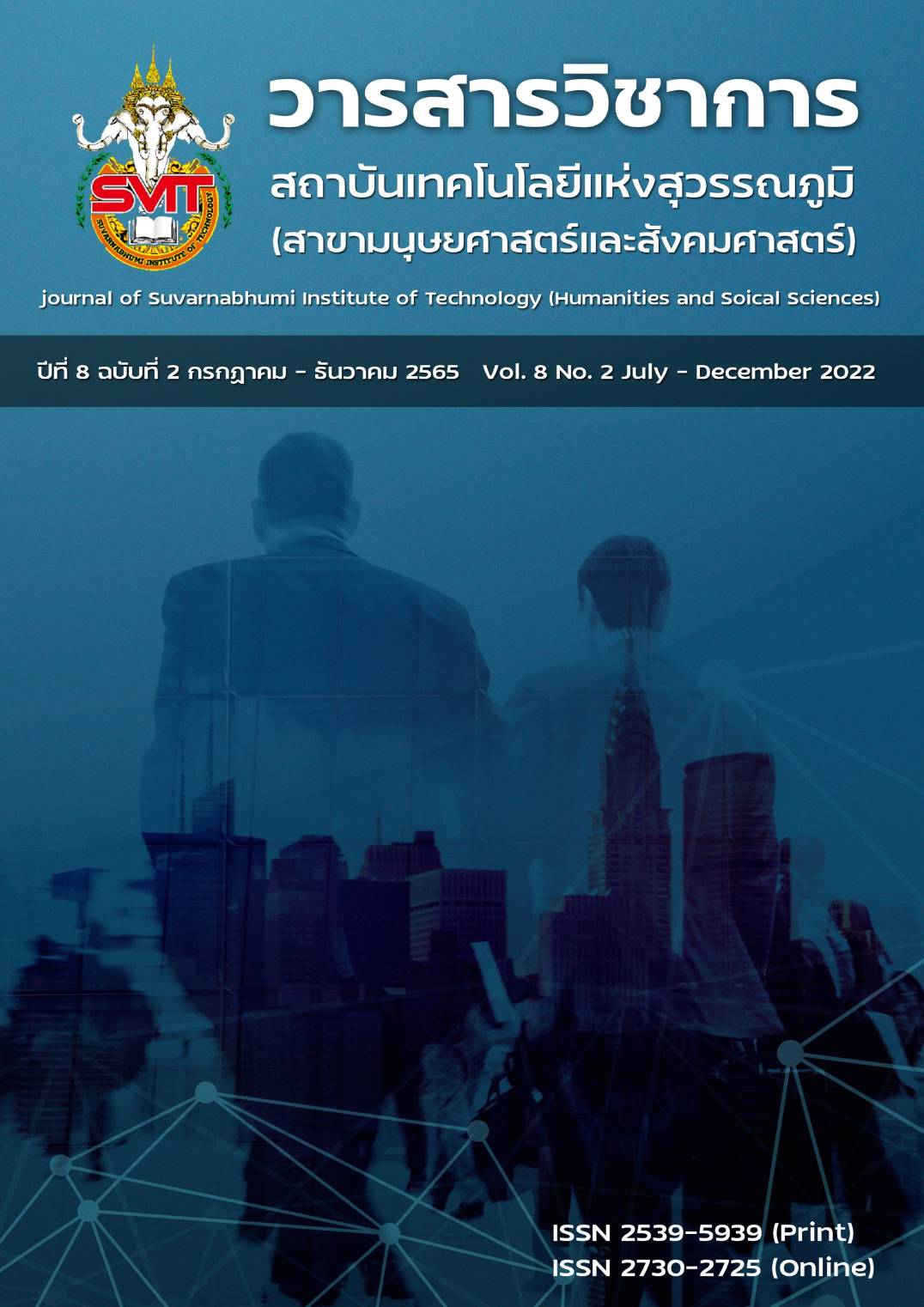CREATING AN ORGANIZATIONAL CLIMATE AFFECTING THE QUALITY OF LIFE PRIVATE SCHOOL TEACHERS UNDER THE EDUCATIONAL OFFICE NAKHON PATHOM PROVINCE
Keywords:
Creating an organizational climate, Quality of life, Private schoolsAbstract
The objectives of this study were 1) to study creating an organizational climate affecting the quality of life of private schools teachers under Educational Office Nakhon Pathom Province 2) to study the quality of working life of private school teachers under Educational Office Nakhon Pathom Province 3) to compare the teachers' opinions on the quality of working life of private schools in Nakhon Pathom province classified by educational background and work experience and 4) to study the creation of an organizational climate affecting the quality of life of private schools teachers under Educational Office Nakhon Pathom Province. The population used in this research were 1,950 teachers. The sample group used in this research were 322 teachers private schools teachers under Educational Office Nakhon Pathom Province. The sample size was determined using the Krejcie and Morgan sample comparison tables and the stratified random sample selection. using The research instruments were Likert’s three sets in 5 rating scale of questionnaires. The questionnaire has a reliability of 0.99. The statistics used for analysis were frequencies, percentage, mean, standard deviation and stepwise multiple regression analysis.
The results of the study found that 1) The creation of an organizational climate affecting the quality of life of private schools teachers under Educational Office Nakhon Pathom Province overall was at a high level. When considering each aspect, it was found that it was at a high level in every aspect. The averages were arranged in descending order as follows: Conflict tolerance unity in the organization performance standards organizational structure, support, warmth, job risk, reward and responsibility. 2) quality of life of private school teachers under educational office Nakhon Pathom Province overall, it's at a high level. When considering each aspect, it was found that it was at a high level in every aspect. The averages were sorted from highest to lowest as follows: pride in the organization Worker Potential Development progress and stability in the work Democracy in Organization freedom from work A safe and healthy environment Adequate and fair compensation. 3) Teachers with different gender, ages and experiences quality of life of working in private schools under educational office Nakhon Pathom Province overall, there was a statistically significant difference at the .05 level. Quality of life of working in private schools under educational office Nakhon Pathom Province overall and each aspect is not different. 4) The multiple correlation coefficient (R) was 0.225 and there was a 51% variance in affecting the quality of life of private school teachers under educational office Nakhon Pathom Province (R2 = 0.48). Effect on Quality of Life of Private School Teachers in Nakhon Pathom Province In order from highest to lowest, they were fair and adequate compensation (Beta = 0.254), safe and healthy environment (Beta = 0.172), democracy in the organization (Beta = 0.146), progress and job security. (Beta = 0.145), social relations (Beta = 0.145), job independence (Beta = 0.139), and organizational pride (Beta = 0.137) were statistically significant at .01 level.
References
ฉวีวรรณ เอี่ยมพญา. (2559). บรรยากาศองค์การที่ส่งผลต่อคุณภาพชีวิตการทำงานของครูในโรงเรียน สังกัดสำนักงานเขตพื้นที่การศึกษามัธยมศึกษาเขต 8. (วิทยายานิพนธ์ปริญญามหาบัณฑิต, มหาวิทยาลัยศิลปากร).
ธนัตถ์ภัทร์ ตรัณธัญศตพร. (2561). คุณภาพชีวิตในการทำงานของข้าราชการและลูกจ้าง สำนักงานเลขานุการ กองบัญชาการกองทัพไทย. (สารนิพนธ์ปริญญามหาบัณฑิต, มหาวิทยาลัยศรีนครินทรวิโรฒ).
บุตรี ถิ่นกาญจน์. (2562). บรรยากาศองค์การที่เอื้อต่อการพัฒนาไปสู่องค์การแห่งการเรียนรู้การศึกษา หน่วยงานผลิตบัณฑิตของมหาวิทยาลัยบูรพา จังหวัดชลบุรี. (วิทยานิพนธ์ปริญญามหาบัณฑิต, มหาวิทยาลัยบูรพา).
บุญชม ศรีสะอาด. (2551). พื้นฐานวิจัยการศึกษา. (พิมพ์ครั้งที่ 4). มหาสารคาม: ภาควิชาวิจัยและ พัฒนาการศึกษาคณะศึกษาศาสตร์มหาวิทยาลัยมหาสารคาม.
บุญสัน อนารัตน์. (2561). ความสัมพันธ์ระหว่าง บรรยากาศองค์การกับคุณภาพชีวิตการทำงานของนักวิชาการสาธารณสุขที่ปฏิบัติงานในศูนย์ สุขภาพชุมชน จังหวัดหนองคาย. (รายงานการศึกษาค้นคว้าอิสระปริญญามหาบัณฑิต, มหาวิทยาลัยขอนแก่น).
วิทยา เพชรไกร. (2561). คุณภาพชีวิตในการทำงานของผู้บริหารโรงเรียนประถมศึกษาและมัธยมศึกษาในจังหวัดยโสธร. (สารนิพนธ์ปริญญามหาบัณฑิต, มหาวิทยาลัยปทุมธานี).
เรวัติ สินอยู่. (2559). คุณภาพชีวิตในการทำงานของข้าราชการครูและบุคลากรทางการศึกษา โรงเรียนสามัคคีราษฎร์บำรุง จังหวัดปทุมธานี. (สารนิพนธ์ปริญญามหาบัณฑิต, มหาวิทยาลัยปทุมธานี).
สำนักงานคณะกรรมการส่งเสริมการศึกษาเอกชน. (2556). การบริหารงาน. กรุงเทพฯ: สำนักงานคณะกรรมการส่งเสริมการศึกษาเอกชน.
สำนักงานคณะกรรมการส่งเสริมการศึกษาเอกชน. (2563). กระบวนการบริหารงานทั่วไป. กรุงเทพฯ: สำนักงานคณะกรรมการส่งเสริมการศึกษาเอกชน.
สมคิด บางโม. (2560). องค์การและการจัดการ. (พิมพ์ครั้งที่ 3). กรุงเทพฯ: วิทยพัฒน์.
สมชาติ อ่อนประดิษฐ์. (2562). คุณภาพชีวิตการทำงานของข้าราชการทหารบก กองซ่อมบำรุงกรมการขนส่งทางบก. (วิทยานิพนธ์ปริญญามหาบัณฑิต, มหาวิทยาลัยบูรพา).
สุชานุช พันธนียะ. (2562). บรรยากาศองค์การที่ส่งผลต่อคุณภาพชีวิตการทางานของข้าราชการครู. วารสารวิทยบริการ, 21(2).
สุรชัย แก้วพิกุล. (2562). คุณภาพชีวิตในการทำงานของบุคลากรมหาวิทยาลัยพยาบาลตำรวจ. (สารนิพนธ์ปริญญามหาบัณฑิต, มหาวิทยาลัยศรีนครินทรวิโรฒ).
อัจฉราภรณ์ บัวลังกา. (2561). บรรยากาศองค์การในโรงเรียน สังกัดสานักงานเขตพื้นที่การศึกษา ประถมศึกษากาญจนบุรีเขต 2. (วิทยานิพนธ์ปริญญามหาบัณฑิต, มหาวิทยาลัยศิลปากร).
Krejcie, Robert V. & Morgan, D.W. (1970, Autumn). Determining Sampling Size for Research Activities. Journal of Education and Psychological Measurement, 30(3), 607-610.
Halpin, A. W., & Croft, D. B. (1966). The Organizational Climate of School. Chicago: University of Chicago.
Huse, E. F. & Cummings, T. G. (1985). Organization Development and Change. Minnesota: West.
Litwin & Stringer. (2002). Motivation and Organizational Climate. Massachusetts: Harvard University.
Downloads
Published
Issue
Section
License
Copyright (c) 2022 Suvarnabhumi Institute of Technology

This work is licensed under a Creative Commons Attribution-NonCommercial-NoDerivatives 4.0 International License.
The articles published are copyrighted by the Sarasas Journal of Humanities and Social Science. The opinions expressed in each article in this academic journal are those of the individual authors and do not reflect the views of Sarasas Suvarnabhumi Institute of Technology. The authors are solely responsible for all aspects of their respective articles. Any errors or inaccuracies in the articles are the sole responsibility of the authors.



